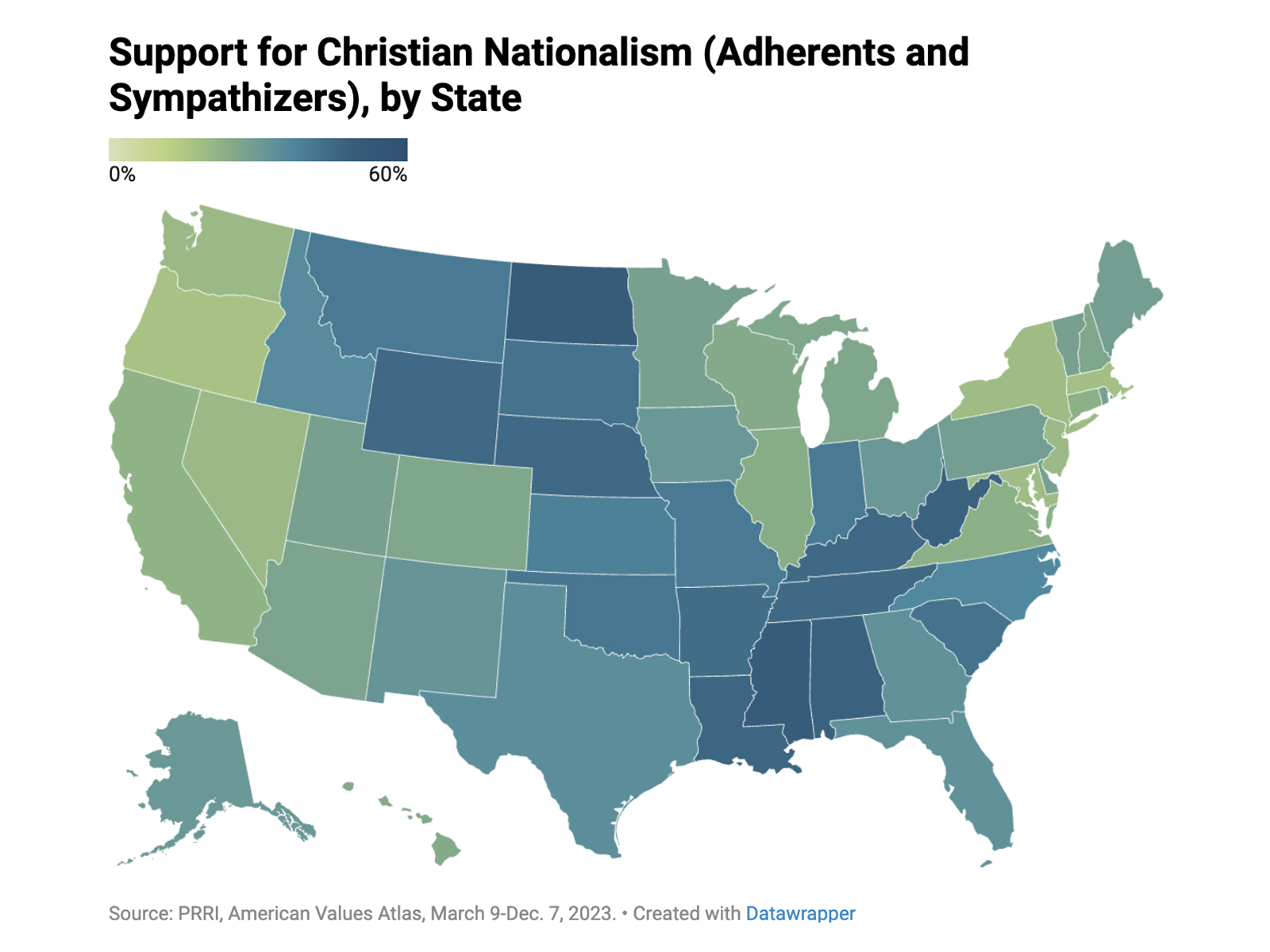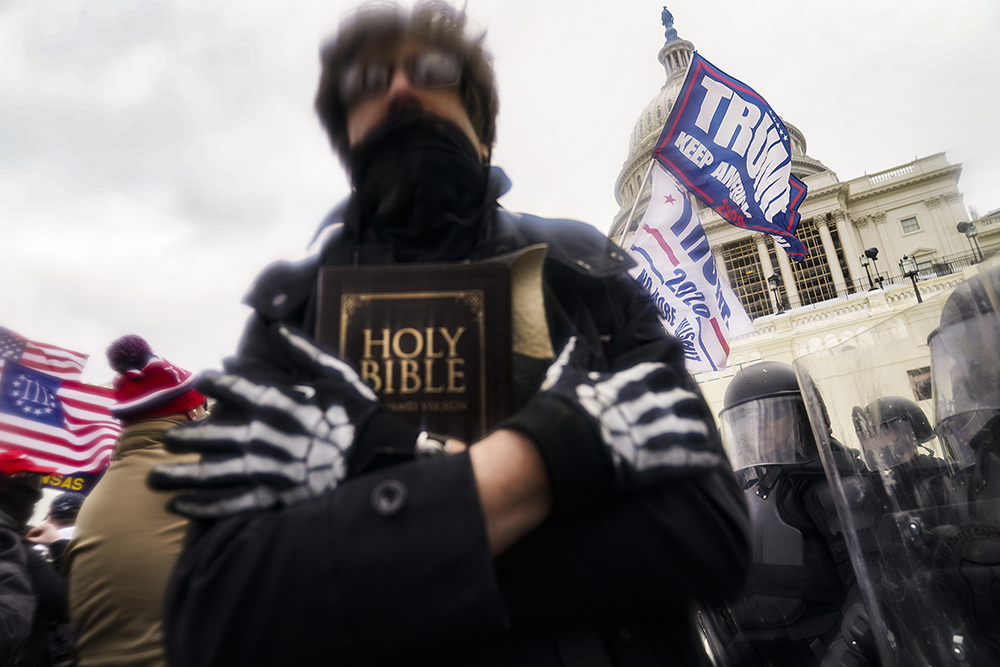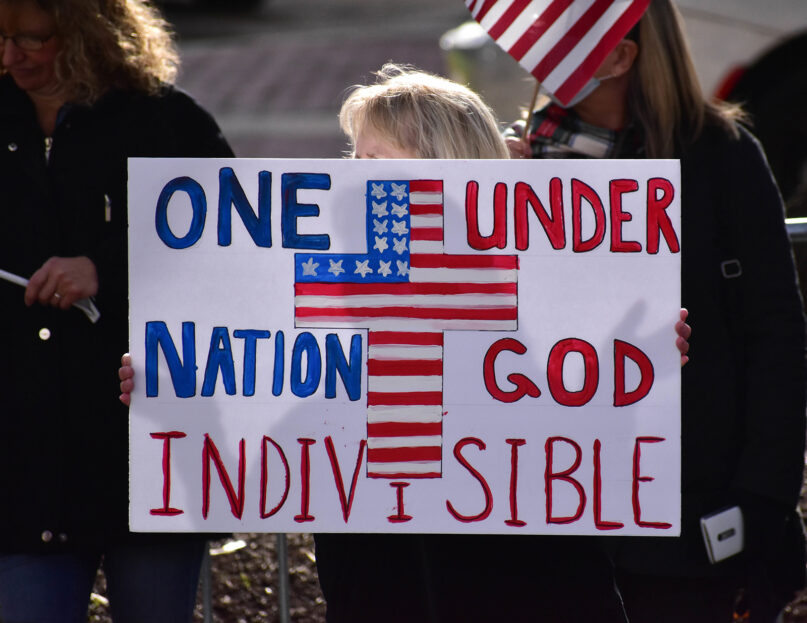(RNS) — A new report released Wednesday (Feb. 28) found that roughly 3 in 10 Americans express some sympathy for Christian nationalism, with its greatest popularity concentrated in the Southeast and Upper Midwest.
The findings appear in a study from the Public Religion Research Institute, which probed public support for Christian nationalism as part of a broader survey of more than 22,000 adults. To assess feelings about Christian nationalism, respondents were asked whether they completely agree, mostly agree, mostly disagree or completely disagree with five statements, including “the U.S. government should declare America a Christian nation” and “U.S. laws should be based on Christian values.”
PRRI broke out four categories depending on how people responded to the questions. Those most supportive of the ideology — 10% of the country — were dubbed Adherents, followed by Sympathizers, who represent 20% of the country. Those who disagreed the statements were classified as Skeptics (37%) or Rejecters (30%).
Mississippi and North Dakota showed the highest levels of support for Christian nationalism, with Adherents and Sympathizers making up 50% of those states. They are followed by Alabama (47%), West Virginia (47%), Louisiana (46%), Tennessee (45%), Kentucky (45%), Nebraska (45%) and Wyoming (45%).
States exhibiting the least support for Christian nationalism were Oregon (17%), Massachusetts (18%), Maryland (19%), New York (19%), New Jersey (20%) and Washington (20%).
Voting patterns reflected the presence of Christian nationalist ideas as well. “Residents of red states are significantly more likely than those in blue states to hold Christian nationalist beliefs,” the report reads. Researchers later note that, overall, nearly 4 in 10 residents of red states express support for Christian nationalism.

“Support for Christian Nationalism (Adherents and Sympathizers), by State” (Graphic courtesy of PRRI)
The survey also noted a strong correlation between support for Christian nationalism and support for the Republican Party, as well as for former President Donald Trump, who has long made appeals to Christian nationalists on the stump.
Last week, in addressing the annual gathering of National Religious Broadcasters, a disproportionately evangelical Christian group, Trump promised the crowd: “If I get in, you’re going to be using that power at a level that you’ve never used before.” He later added: “With your help and God’s grace, the great revival of America begins on Nov. 5.”
In PRRI’s survey, among those who hold favorable views of Trump, 55% qualify as Christian nationalists (21% Adherents and 34% Sympathizers). Only 15% (4% Adherents and 11% Sympathizers) of those who hold favorable views of President Joe Biden were identified as Christian nationalists.
“As the proportion of Christian nationalists in a state increases, the percentage of residents who voted for Trump in 2020 also increases,” the report reads. “If the analysis is restricted to white Americans only, the relationship between state-level support for Christian nationalism and votes for Trump in 2020 becomes even stronger.”
The survey found support for Christian nationalism concentrated in two religious groups: white evangelical Protestants (66%) and Hispanic Protestants (55%). Christians who ascribe to beliefs often associated with Pentecostals and charismatic Christianity, such as modern-day prophecy, spiritual healing and the prosperity gospel, were particularly drawn to the ideology.

In this Jan. 6, 2021, file photo, a man holds a Bible as Trump supporters gather outside the Capitol in Washington. The Christian imagery and rhetoric on view during the Capitol insurrection sparked renewed debate about the societal effects of melding Christian faith with an exclusionary breed of nationalism. (AP Photo/John Minchillo)
Christian nationalism has been associated with political violence in part because of the ideology’s visible influence on the Capitol insurrection that took place on Jan. 6, 2021. According to PRRI’s survey, there’s reason to suspect that association is not a coincidence: Christian nationalists are about twice as likely as other Americans to believe political violence may be justified, with 38% of Adherents and 33% of Sympathizers agreeing that “because things have gotten so far off track, true American patriots may have to resort to violence to save the country.”
The survey also offered a potential preview of how Christian nationalism — and the political coalitions associated with it — could end up shaping this year’s presidential election. Asked about immigration and access to guns, about 50% of Adherents said they would only vote for a candidate who shared their views on the issues.
But the most ardent Christian nationalists will hardly be the most powerful force come November: Asked about abortion, half of Rejectors, who alone nearly outnumber Adherents, said they were unwilling to support a candidate who differs from them on their mostly liberal abortion views.
(This story was was reported with support from the Stiefel Freethought Foundation.)





